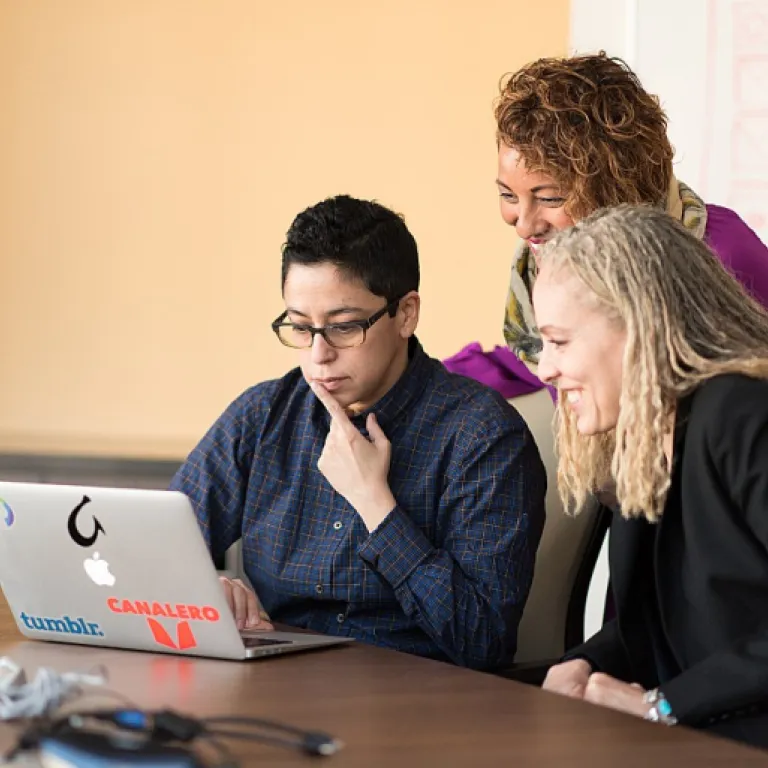
Understanding DEI in the Hiring Process
Grasping the Essence of DEI in Recruitment
In today's competitive job market, understanding Diversity, Equity, and Inclusion (DEI) within the hiring process is crucial for organizations aiming to attract top talent. DEI initiatives are not just buzzwords; they are essential components that shape the candidate experience and influence a company's culture and values. By prioritizing DEI, companies can create a more inclusive recruitment process that resonates with diverse talent pools.
DEI efforts in recruitment involve more than just meeting diversity quotas. They require a comprehensive approach that addresses unconscious bias and promotes equity inclusion throughout the hiring process. This includes everything from crafting inclusive job descriptions to ensuring that interviews are conducted in a manner that respects diversity and fosters engagement.
Organizations that successfully integrate DEI into their recruitment practices often see a positive impact on employee engagement and retention. By fostering a culture of inclusion, companies can enhance the candidate experience, making it more likely that candidates will feel valued and respected from the very first interaction.
For more insights on how to build an inclusive workplace culture, you can explore understanding the essence of an inclusive workplace culture.
Challenges in Implementing DEI Strategies
The Roadblocks in Implementing DEI Strategies
The initiative to enhance the candidate experience through strategic DEI efforts often encounters several challenges. One major obstacle is the prevalent unconscious bias within the hiring process. This can occur at various stages, from candidate selection to onboarding, and can significantly dampen a recruitment process aimed at being inclusive and equitable. These biases can affect the perception of diverse talent and skew decisions that should be based on merit and fit rather than preconceived notions. Additionally, organizations may face difficulty in integrating DEI into their existing company culture and values. To create an inclusive environment conducive to attracting top talent, it sometimes requires altering longstanding practices that may inadvertently exclude or marginalize certain groups. Efforts must be made by hiring managers and leadership to mold an inclusive culture where every employee feels valued and respected. Moreover, the absence of a clear framework or guidelines for DEI initiatives can lead to inconsistencies in application across different departments within a company. This inconsistency undermines the overall engagement and experience of candidates as they move through the hiring process. Feedback from diverse groups and continuous revisions can help eliminate these disparities and enhance the candidate experience in the long run. Financial and resource constraints also pose a considerable challenge. Allocating budget, time, and manpower to develop effective DEI strategies may seem daunting for some organizations. However, investing in diversity and inclusion is crucial not only for the health of the workforce but also for the growth of the company itself. Resources must be allocated strategically to ensure that DEI is not just a buzzword, but an actionable element that significantly improves the recruitment process. Technological and administrative transitions required for DEI initiatives often lead to difficulties too. Resistance to change, especially in larger organizations with established procedures, can tarnish efforts to innovate DEI practices. Continual education and training on diversity, equity, and inclusion can ease these transitions and promote a more inclusive hiring process. Exploring the roadblocks around implementing effective DEI strategies not only helps in overcoming them but also reinforces the commitment to fostering a diverse and inclusive workplace. Embracing such challenges as opportunities for growth is key to driving forward a successful DEI program that enriches both the organization and its candidates.Innovative DEI Practices for a Better Candidate Experience
Fostering an Inclusive Hiring Experience
Incorporating innovative DEI practices into the recruitment process can significantly enhance the candidate experience. Organizations aiming to attract diverse talent need to ensure that their recruitment strategies are both inclusive and equitable. This means addressing unconscious bias, promoting equity inclusion, and emphasizing the importance of a diverse company culture. An effective approach is to structure interviews to minimize bias, enabling hiring managers to focus on the skills and experiences candidates bring. Standardizing interview questions and scoring rubrics can ensure a fair process for all candidates. Additionally, training hiring teams on DEI principles helps in cultivating a strong understanding of diversity inclusion. To further support DEI initiatives, companies can leverage social media to communicate their culture values and diversity commitments. By showcasing their DEI efforts, they can reach a broader audience and attract top talent. An inclusive recruitment process not only improves the candidate experience but also lays a foundation for a diverse and innovative workforce. Moreover, providing candidates with timely feedback throughout the hiring process can enhance their overall experience. Transparency in communication fosters trust and engagement, pivotal elements in building a positive perception of the company. Integrating technology in the recruitment process can also help in streamlining DEI initiatives. Automated tools can identify potential biases and recommend inclusive language in job descriptions. Using AI-driven platforms to analyze candidate data can further assist in ensuring equitable candidate selection. As companies continue to refine their DEI practices, measuring their success is crucial. By tracking metrics related to diversity equity and inclusion, organizations can assess the effectiveness of their strategies and make necessary adjustments. Additionally, user feedback from candidates can provide valuable insights into the strengths and areas for improvement in the candidate experience. Enhancing candidate experience through DEI initiatives not only attracts diverse talent but also builds a more inclusive workplace. By integrating these practices, organizations can foster a culture of inclusion, driving employee engagement and overall success. For additional insights on boosting [employee engagement affordably], consider exploring further strategies.The Impact of Technology on DEI Initiatives
The Role of Technology in Fostering Inclusive Hiring
The integration of technology has revolutionized how organizations approach diversity, equity, and inclusion (DEI) in their recruitment processes. By leveraging technology, companies can enhance candidate experience and promote a more inclusive hiring environment. One significant way technology has transformed DEI initiatives is through the reduction of unconscious bias. AI-driven recruitment tools are carefully designed to ensure that hiring managers evaluate candidates based only on their skills and experiences, rather than irrelevant personal characteristics. This step not only levels the playing field but also ensures that diverse talent is given an equal opportunity to succeed. Further enhancing the hiring process, data analytics is increasingly playing a role in tracking diversity and inclusion metrics. Through careful data analysis, organizations can pinpoint areas of improvement and measure the effectiveness of their DEI efforts. This analytical approach assists in creating a more inclusive environment by ensuring that diversity equity is sustained, not only in recruitment but throughout an employee's journey, from onboarding to long-term employee engagement. Social media and online platforms are also pivotal in reaching a broader talent pool, providing companies with the chance to attract candidates from different backgrounds. By utilizing these channels, it becomes possible to tap into networks of underrepresented groups, lending more voices and diversity within the organization. Lastly, virtual reality (VR) and other emerging technologies are being employed in the recruitment process to create immersive experiences during candidate interviews and assessments. This innovation enables candidates to better understand a company's culture values and inclusive practices, enhancing candidate engagement and making the recruitment process more appealing and informative for top talent. As technology continues to evolve, its impact on DEI initiatives and the candidate experience is bound to grow, promising more inclusive, effective recruitment processes and contributing to sustainable organizational success.Measuring Success in DEI Candidate Experience
Evaluating the Effectiveness of DEI Initiatives
Measuring the success of Diversity, Equity, and Inclusion (DEI) initiatives in the candidate experience is crucial for organizations aiming to attract top talent and foster an inclusive culture. To ensure that DEI efforts are making a tangible impact, companies need to establish clear metrics and continuously assess their recruitment process.
Key Metrics for Assessing DEI Impact
- Diversity of Candidate Pool: Track the diversity of applicants at each stage of the hiring process. This helps identify any unconscious bias that may be present and ensures a diverse talent pool is being considered.
- Candidate Feedback: Collect feedback from candidates about their experience during interviews and onboarding. This can provide insights into how inclusive the recruitment process feels to diverse candidates.
- Employee Engagement Surveys: Use surveys to gauge the level of engagement and satisfaction among new hires, particularly those from underrepresented groups. This can highlight areas where the company culture may need improvement.
- Retention Rates: Monitor the retention rates of diverse employees. High turnover among these groups may indicate issues with inclusion or company culture values.
Continuous Improvement and Adaptation
Organizations should view DEI initiatives as an ongoing journey rather than a one-time effort. Regularly reviewing and adapting practices based on feedback and data is essential. This approach not only enhances the candidate experience but also strengthens the overall company culture.
Leveraging Technology for Better Insights
Technology plays a pivotal role in measuring DEI success. Advanced analytics tools can provide deeper insights into the recruitment process, helping hiring managers identify patterns and areas for improvement. Additionally, social media platforms can be used to engage with diverse talent and promote the organization's commitment to diversity inclusion.
Ultimately, the goal is to create a recruitment process that is not only equitable but also reflective of the organization's commitment to diversity equity and inclusion. By focusing on measurable outcomes and continuous improvement, companies can enhance the candidate experience and attract top talent.













